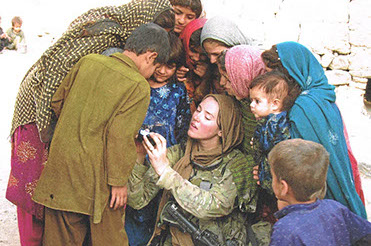MILITARY PEDIATRICS
The Department of Pediatrics improves the health and well-being of children, and the military family, on the home front, the battlefield, and beyond.
Home front. The military child experiences amazing opportunities but also unique social and health challenges. It not only fills our moral obligation as physicians and scientists to deliver the most effective and high quality care possible, but it is also important for military readiness. The deployed warfighter not only expects cutting-edge health care for themselves when deployed, but also for the same world-class health system to care for those they leave behind. The U.S. military, and its families, answers the call to serve our nation around the world and 24 hours-a-day, 7 days-a-week, and Military Pediatricians are there with them.
Battlefield. Military Pediatricians have served with distinction on battle fields throughout our nation’s history. From Cuba and Philippines in the late 19th century, to battlefields and military camps of WWI WWII, Korea, and Vietnam, through more recent conflicts in Iraq and Afghanistan, Military Pediatricians have secured the health and welfare of U.S. forces and shared the same burdens as other troops in the field. Furthermore, the U.S. warfighter has a noble legacy of caring for children across the globe during times of conflict - a tangible sign to conflict affected communities of the goodwill of the people of the United States.
Beyond. Whether supporting global health engagement missions around the world or through cutting edge research, we support education and training programs that prepare students, physicians, and other medical providers to lead and succeed in complex disaster and humanitarian assistance missions and partners with a global network of military and civilian collaborators to improve health within the Military Health System and around the globe. Our research is responsive to the emerging needs of both the Military Child, the war-fighter, and the global community that we serve. Pediatric research at USU also improves the readiness and welfare of service members by addressing dual threats and the novel application of our results that are relevant to both populations.

